May 12 marks the International Day of Plant Health, an initiative launched by the UN Food and Agriculture Organization (FAO) to raise awareness of how plant health underpins food security, biodiversity, and sustainable development. The 2025 theme, “The Importance of Plant Health in One Health,” highlights that protecting plants is an integral part of protecting the health of the planet.
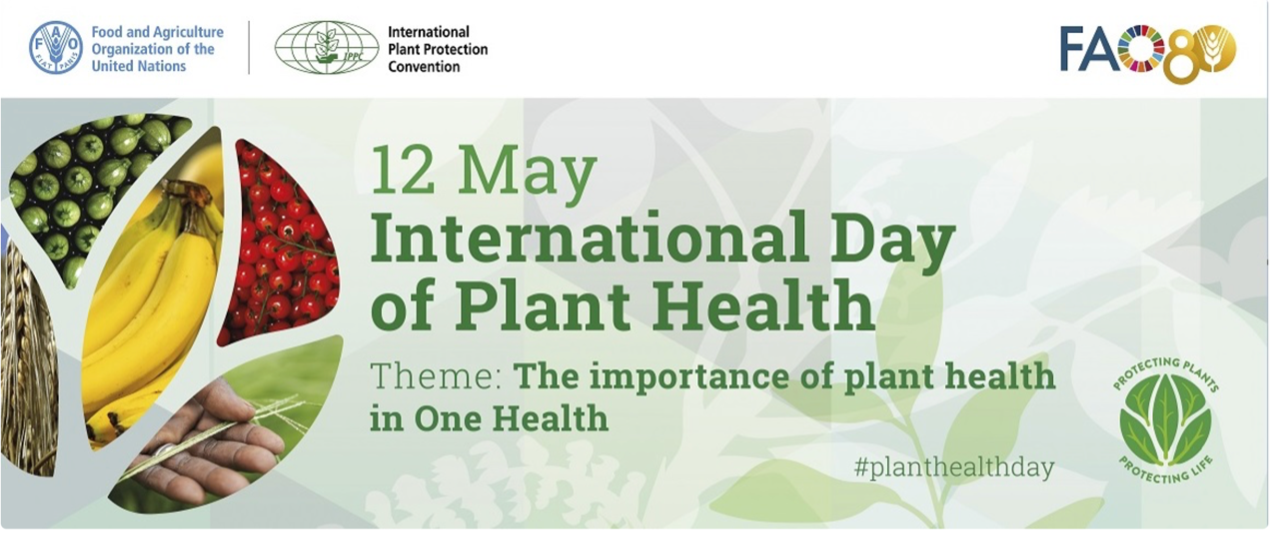 Theme for the International Day of Plant Health 2025 (Credit: Food and Agriculture Organization of the United Nations)
Theme for the International Day of Plant Health 2025 (Credit: Food and Agriculture Organization of the United Nations)
BGI Group: Advancing Genomic Solutions for Plant Health
Plant health is the foundation of food security and is deeply interconnected with human and environmental health. According to the FAO, up to 40% of global crop yields are lost annually due to pests and diseases, causing over $220 billion in economic losses. Climate change and global trade accelerate the spread of invasive species, putting many plants at risk of extinction, underscoring the urgent need to safeguard plant health for biodiversity and food system stability.
As a global leader in genomics, BGI Group actively supports the mission of the International Day of Plant Health by leveraging genetic technologies to protect plant health and biodiversity. Through plant genome sequencing and mapping, BGI Group is working to address the rising threat of plant extinction and contributes to global food security.
A key initiative, the Ten Thousand Plant Genome Project (10KP), which is part of the Earth BioGenome Project (EBP), aims to sequence the genomes of 10,000 plants. This ambitious effort advances biodiversity conservation, plant evolution research, and agricultural innovation through global collaboration and scientific research.
As of March 2025, the 10KP project, powered by BGI Group’s proprietary sequencing platforms, has assembled over 550 plant genomes and generated 1.02 petabases (PBs) of data. This project has produced 80 SCI papers, including 18 in top journals (Cell, Nature, Science), significantly advancing our understanding of plant evolution and diversity.
As an essential participant of the 10KP initiative, BGI-Research, a core research arm of the BGI Group, successfully sequenced and assembled high-quality genomes of several economically and ecologically important timber species, including Swietenia macrophylla and Khaya senegalensis (mahoganies), Dalbergia sissoo (Indian rosewood), among others.
These valuable species, prized for their durable and fragrant heartwood, are under threat from overexploitation. By identifying genes associated with heartwood, these assemblies may aid in tree improvement efforts and help shorten breeding cycles. Additionally, their relatively complete gene inventories can facilitate research into the biosynthesis of medicinal compounds. These high-quality genomes provide tools for promoting the ecologically sustainable utilization of precious tree species and realizing their potential to enhance climate resilience in managed forests.
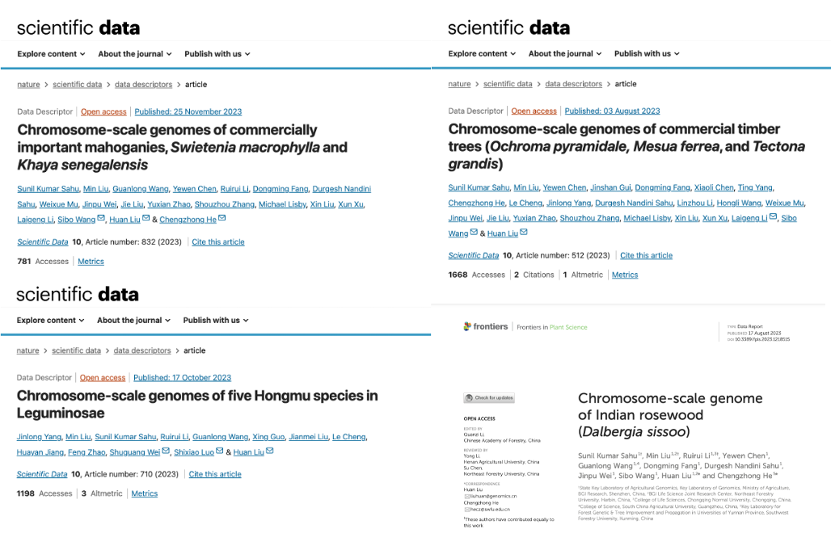 The Chromosome-scale genomes series of the four research papers.
The Chromosome-scale genomes series of the four research papers.
In addition to this study, BGI has also decoded the genomes of key plant lineages—including Magnolia, Cycas, Ferns, Bryophytes, and Streptophyte algae—and has revealed insights into early angiosperm evolution, seed plant origins, plant-bacteria symbiosis, and the transition of green plants to land.
In the future, powered by BGI’s independently developed long-read sequencing platform, the 10KP project aims to complete the assembly of 1,000 plant genomes by the end of 2025, advancing research on plant evolution and gene function.
Supporting Food Security through Crop Innovation
In addition to sequencing plant genomes to protect species diversity, BGI Group is advancing agricultural research - developing perennial rice and revitalizing Africa’s orphan crops - to strengthen crop health and enhance global food security.
BGI Group has introduced perennial rice - a breakthrough crop in agriculture that can be harvested for multiple years without the need for replanting. This innovation significantly reduces planting costs while improving yield and resilience in the face of climate challenges.
Perennial rice was recognized by Science in 2022 as one of the “Top 10 Scientific Breakthroughs” for its high yield, adaptability, and perennial traits, and was recommended by China’s Ministry of Agriculture for widespread adoption. In 2023, it was further included in the African Union’s agricultural technology promotion framework and listed in the Seeds and Biotechnology Program for 2024–2025.
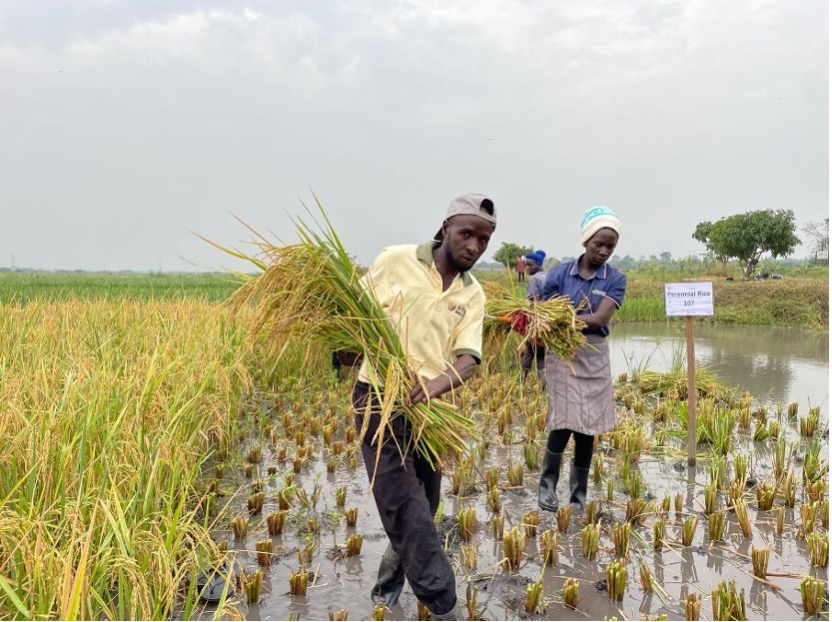 Ugandan farmers harvesting perennial rice, April 2024.
Ugandan farmers harvesting perennial rice, April 2024.
Uganda, as the first country outside Asia to release a perennial rice variety, is leading the way in demonstrating the environmental and productivity benefits of perennial crops. Through the FAO South-South Cooperation Program and local partnerships, the perennial rice variety "NARO Rice One" has achieved harvests up to twice those of traditional varieties. Its success has inspired new projects in Burundi, Madagascar, and Malawi.
Along with developing new crops, researching Africa’s existing orphan crops, which are often overlooked by modern agriculture, is also an effective approach for protecting crop health and addressing the food crisis.
BGI, in collaboration with the African Orphan Crops Consortium (AOCC) and the International Crops Research Institute for the Semi-Arid Tropics (ICRISAT), is advancing research on Africa’s underutilized orphan crops—an effective strategy to protect crop health and address food insecurity. By decoding the genetic blueprints of more than 10 African crops, BGI has helped identify traits related to climate resilience, improved nutrition, and disease resistance. Landmark achievements, such as the sequencing of over 3,000 chickpea genomes, are empowering African breeders to develop robust, high-yielding, and nutrient-rich crop varieties for both local and global markets.
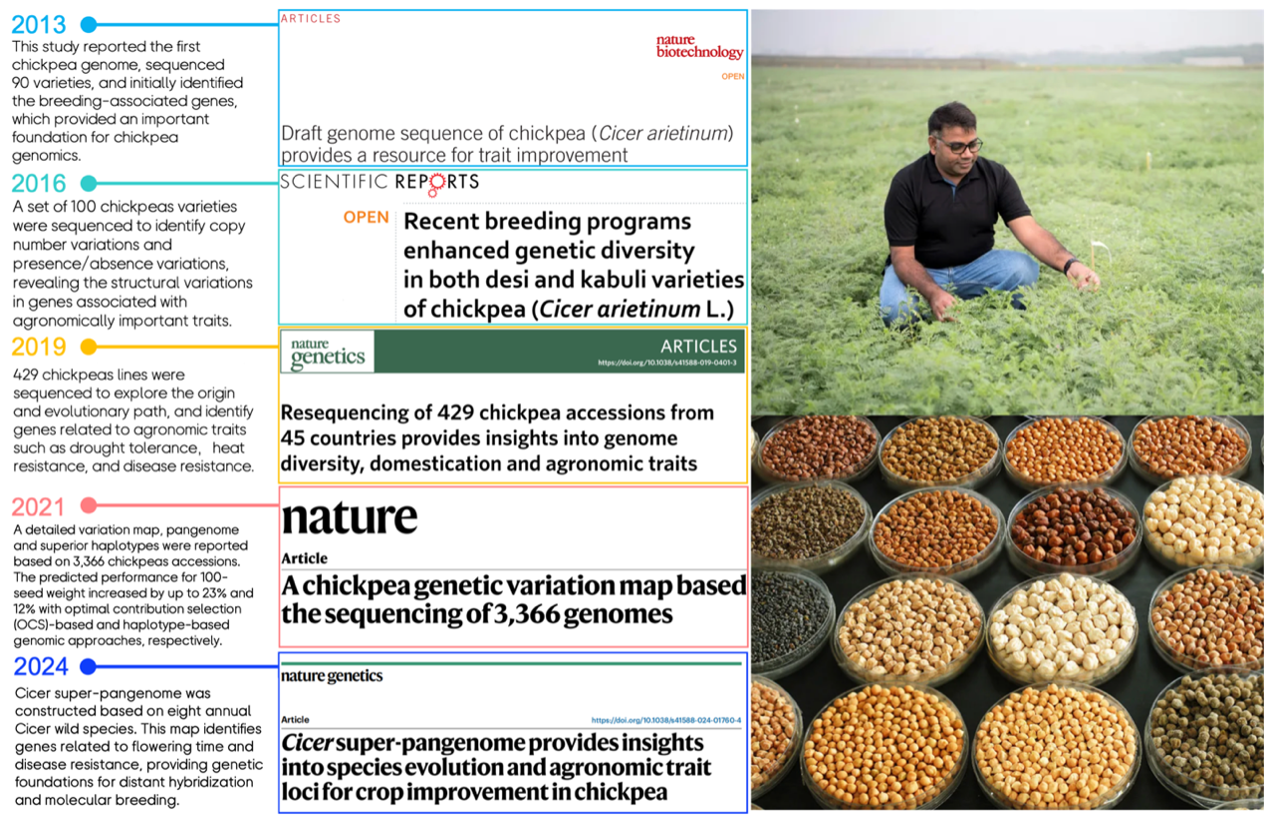 Since 2013, BGI has collaborated with leading scientists and institutes worldwide on a series of chickpea genome studies and landmark achievements (photo courtesy of Rajeev Varshney).
Since 2013, BGI has collaborated with leading scientists and institutes worldwide on a series of chickpea genome studies and landmark achievements (photo courtesy of Rajeev Varshney).
Conserving Endangered Plant Species
Beyond agriculture, BGI is also committed to conserving endangered plant species through partnerships with other institutions.
Cycads, or “living fossil plants”, are the oldest surviving seed-bearing plants on earth. The origins of this remarkable plant - dubbed the “panda of the plant kingdom” for its uniqueness and rarity - dates back about 300 million years ago to the Jurassic era.
Today, cycads are listed as critically endangered species on the International Union for Conservation of Nature’s (IUCN) Red List and are also key protected plants at the national level in China. However, due to its large and complex genome, the cycad clade has, until recently, lacked a complete genome map.
In May 2022, through the 10KP project, BGI-Research, together with other international researchers, completed the genome sequencing of cycads and published the research results as a cover story in Nature Plants.
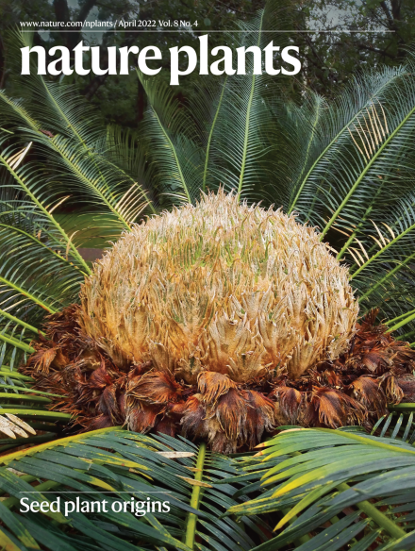 The completed mapping and research results of cycads genome published on Nature Plants as cover story (Credit: Nature Plants)
The completed mapping and research results of cycads genome published on Nature Plants as cover story (Credit: Nature Plants)
On November 19, 2024, the "Global Cycad Genome Initiative" was officially launched, with BGI-Research serving as a leading force in the project. The initiative is led by the Shenzhen Fairy Lake Botanical Garden and Chinese Academy of Sciences and jointly initiated by BGI-Research and nine other institutions. Dr. Xu Xun, Director of BGI-Research, serves as Joint Chair of the project alongside other leading experts.
BGI-Research will spearhead international collaboration and the application of advanced multi-omics technologies to construct high-quality reference genomes and pan-genomes for cycad species. The initiative aims to study the genetic structure and morphological evolution of cycad populations and develop genome-based conservation strategies. Through these efforts, BGI-Research will provide a strong scientific and technical foundation for the protection of endangered cycads, make significant contributions to global biodiversity conservation, and help shape international conservation strategies and policies.
In addition to cycads, BGI Group has partnered with leading conservation organizations and a university to launch the Orchid Genome Project, supporting global efforts to protect endangered orchids. Led by BGI, the project will sequence and analyze the genomes and transcriptomes of Xiaolanyu Phalaenopsis and 10 representative orchid species - including Apricot, Magnolia, and Cymbidium. This research will deepen understanding of orchid ecology, unique traits, environmental adaptability, and evolutionary mechanisms.
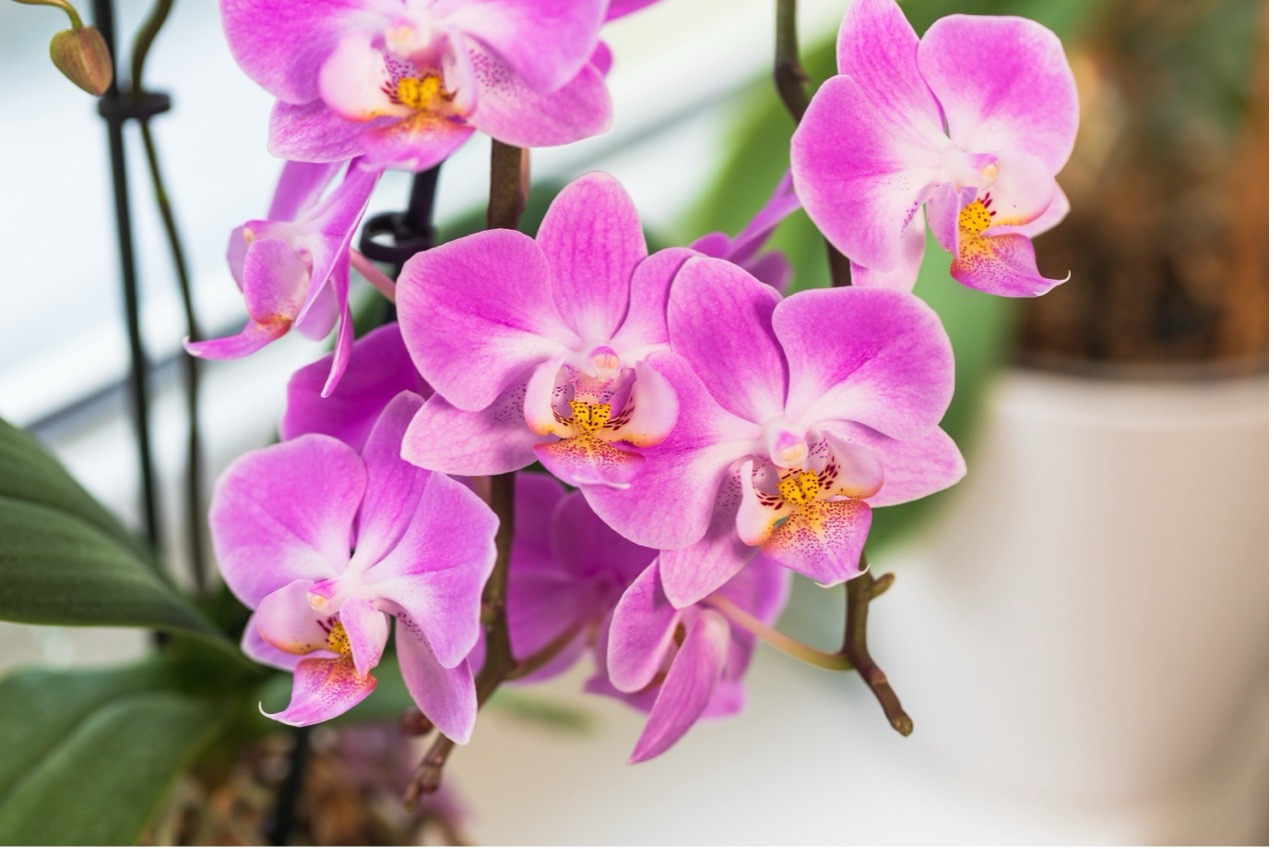
BGI Group embraces the principle of "Omics for All," using genomics to benefit humanity—a mission that echoes the International Day of Plant Health’s message: “When we protect plants, we protect lives.” Aligned with this purpose, BGI is dedicated to safeguarding plant health, preserving biodiversity, and ensuring food security through scientific innovation and global collaboration, helping to build a more sustainable future for all.



